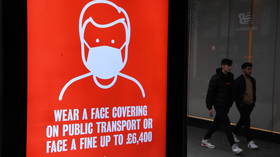Two-thirds of Britons say UK bungled 2nd wave of Covid-19, over half call govt’s response to crisis ‘NATIONAL HUMILIATION’ – poll

The majority of people in the UK do not trust the government to control the spread of Covid-19 and say officials have failed to prepare for a second wave, a new survey shows.
The survey by King’s College London and Ipsos MORI was based on 2,244 interviews with people aged 16-75 that were conducted between November 20-24.
The research revealed that 57 percent do not trust the government to control the spread of Covid-19. Nearly two-thirds – 64 percent – specifically stated they thought officials failed to properly prepare for a second wave of infections.
The proportion of those distrusting the government on Covid-19 issues has doubled since the start of the pandemic eight months ago, the researchers noted.
“The UK government began this crisis with seven in 10 people saying they trusted its handling of the pandemic – but it has hemorrhaged public confidence ever since. Now, for the first time, a majority say they distrust its management of the crisis,” Bobby Duffy, the director of the Policy Institute at King’s College London, said.
Sixty-eight percent of the polled people agreed that the government’s response to Covid-19 was “confused and inconsistent,” while 51 percent think it has been a “national humiliation.” Half of the respondents said they were angry at the government over how it handled the pandemic.
Also on rt.com ‘The day UK led humanity’s charge against Covid’: Tory MP Sharma mocked for over-the-top cheer as London approves foreign vaccineHowever, despite many complaints, 44 percent still said they supported the government’s current approach, while 25 percent said they opposed it. These numbers have remained largely unchanged since July, when this question was last asked by researchers.
Since the early days of the pandemic, Prime Minister Boris Johnson and his cabinet have been heavily criticised over issues like the high death toll in care homes and mixed messaging about how the public should behave during the crisis. In October, Labour Party chief Keir Starmer blasted the PM for having “lost control of the virus.” Most recently, some local officials were warning that Johnson’s three-tier system of regional lockdowns had a crippling effect on the economy.
Officials are placing high hopes on the vaccination programme that is set to kick off on December 8. Business Secretary Alok Sharma said 800,000 doses of the Pfizer-BioNTech vaccine will be available next week.
In an interview with the Daily Telegraph, Health Secretary Matt Hancock called the start of the vaccination on Tuesday “V-Day.” He admitted that delivering vials of vaccine across the country was “challenging,” saying the precarious process was “a bit like transporting eggs.”
Also on rt.com ‘They’re really pros’: Fauci backtracks on criticism of hasty UK vaccine approval, as regulator defends decisionMeanwhile, the head of the Association of the British Pharmaceutical Industry, Richard Torbett, warned last month that a possible ‘no-deal’ Brexit could add extra red tape and demand additional cost on the pharmaceutical companies amid the vaccination programme. However, James Kane of the London-based Institute for Government think tank argued that decisions made during the rollout of the vaccine would have “little” to do with Brexit.
According to the Daily Telegraph, the government plans to adjust its messaging to dispel fears that Brexit could derail vaccination.
“In the same way that we’ve been working on the vaccine itself for months, we’ve been working on ensuring a positive narrative, and the right information comes out,” Hancock said.
Think your friends would be interested? Share this story!














